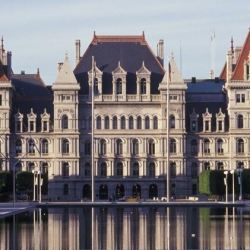The New York Senate included sports betting and online poker as revenue sources in a yearly budget proposal released this week. This is the third year in a row that online poker was included, but the first time sports betting had a line item in the budget.
Governor Andrew Cuomo’s proposed budget did not include online poker in his proposed budget. The New York General Assembly’s budget also did not include online poker.
Annual budgets are wish lists by a legislative house or state administration.
When dealing with a second state house and an administration, such budget proposals never are a 100% reflection of the final budget the three groups pass into law.
One part of the sports betting bill is not like people have seen in other states that have made provisions for legal sports betting.
Bonacic’s “Integrity Fee” Proposal
The Bonacic bill acknowledges the major American sports leagues, which maintain headquarters in New York City. John Bonacic included an “integrity fee” in the bill.
An integrity fee provides a small cut of the proceeds to the sports leagues involved in the bet. For instance, if a bettor made a wager on a National Football League game, then the NFL would collect a small cut of the action.
Integrity Fee of .25%
The proposed integrity fee is 0.25% of the wagers. A cap of 2% of the casino sportsbook’s net revenues would be imposed, after winners are paid. NBA Commissioner Adam Silver has advocated for an integrity fee, though none of the other league commissioners have.
When Adam Silver proposed an integrity fee, Nevada sportsbooks balked at the notion — stating it would put undue strain on their ability to compete with illegal offshore bookmakers. Of course, Las Vegas sports betting operations are used to having no integrity fees, while potential New York sportsbooks likely would be satisfied to have the opporunity to take sports wagers.
2017 Online Poker Bill
The online poker language cited in the budget is the same Senate Bill which was passed in 2017. State Senator John Bonacic has passed online poker legislation the past 2 years, though the measure has failed to pass in the General Assembly in either 2016 or 2017.
In both cases, New York Assemblyman Gary Pretlow has championed the iPoker legislation the General Assembly. In December 2016, Pretlow pulled the bill back at the last minutes, as he was concerned about geolocation and other safety measures in the bill. In June 2017, he was unable to put together the votes to pass the bill, so it never reached the floor of the Assembly. Pretlow expressed confidence that online poker could be passed in 2018.
Sports Betting Legislation
The sports betting legislation attached to the 2018 Senate budget was passed by Bonacic’s Senate committee on Tuesday of this week. It would legalize land-based sportsbooks at New York state casinos and racetracks, if the United States Supreme Court strikes down the Professional and Amateur Sports Protection Act (PASPA) in an expected ruling in the next few months.
The odds that either bill is signed into law in 2018 are debatable. As stated, online poker has not received support in the General Assembly in previous years. Legalized sports betting could be even more fraught with legislative peril.
New York Tribal Casinos
Due to their specially-recognized sovereignty under US federal law, Native American casinos would have special problems installing a sportsbook quickly and seamlessly. To sign up to the New York sports betting law quickly, tribal casinos would have to disavow their sovereignty — something they would never do.
In short, tribal casinos would need to renegotiate their gaming compacts with the State of New York. Such negotiations are often contentious. In fact, the Seneca Nation currently is in a longstanding dispute with Gov. Andrew Cuomo over casino tax revenues. That dispute is a good sign of the kind of trouble a new negotiation might pose for New York state’s tribal gaming authorities.
Opposition to Legal NY Sportsbooks?
Any lawmakers closely aligned with the tribal gaming authorities — or who take big political donations from them — might oppose a clean New York sports betting bill. In Michigan, the tribal casino operators have called for commercial, non-tribal casinos to be required to wait 5 years before launching sportsbooks. Supposedly, the 5-year moratorium would give the tribal casinos 60 months to negotiate arrangements with the State of Michigan.
If the Seneca Nation and its allies called for such a clause in the New York state sports betting bill, it is hard to see how the two sides could pass a bill. Inevitably, the commercial casino’s favorite lawmakers would oppose such a bill. In such ways, gambling legislation is often tabled from year to year.

